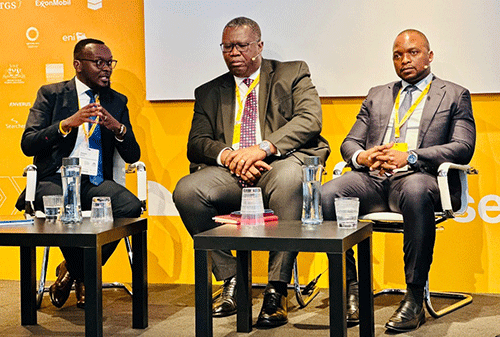This year’s Africa Energies Summit featured prominent speakers, panel discussions and interactive sessions, focusing on key topics shaping the future of energy in Africa.
One of the speakers included the managing director of Monasa Advisory & Associates and chairperson of the Economic Association of Namibia, Jason Kasuto.
The summit, which took place from 14 to 16 May 2024, was organised by Frontier Communications, and is now in its 10th year.
It is a cornerstone event that brings together leaders and innovators from across the continent to discuss Africa’s dynamic energy landscape.
The annual summit serves as a
platform for stakeholders to explore opportunities, address challenges and collaborate on solutions in Africa’s energy sector.
Kasuto took the stage in central London to share his expertise and insights on the crucial topic of local content
policy, and its implementation in Africa’s energy sector.
His expertise and experience in energy policy and regulation added a valuable addition to the line-up of distinguished speakers, which also featured a few Namibian delegates, including Maggy Shino (petroleum commissioner), Shakwa Nyambe (SNC Inc.) and Nelson Lucas (Standard Bank).
He discussed the importance of using foresight tools like the Namibian socio-economic assessment model (SAM) to analyse the potential impact across various sectors.
“We must start with a thorough analysis of potential impact across various sectors by applying socio-economic impact foresight tools, such as the SAM that is built to assess impacts specific to the country context. For example, N$1 spent on cement in Namibia has a different impact than N$1 spent on the same in West Africa.
“The SAM analyses the impact of each dollar spent across industries, its multiplier impact on employment, household income and local gross domestic product (GDP). This allows us to apply foresight and have a more accurate view of where the most value can be attained (even in indirect sectors beyond oil & gas), and where improvements in value attainment can be found,” Kasuto noted.
He further emphasised a need for a firm-level analysis of small and medium enterprises (SMEs), as well as large enterprises to differentiate between a quality gap and a capability gap.
“Prioritising goods and services for local development must consider both dimensions. The assumption is that an intervention for a potential supplier with a high capability gap would be quite different to one with a high-quality
gap.
“For example, a high-quality gap firm would require training, while high capability firms would require access to procurement pathways and credit to expand facilities or invest in new equipment,” he continued.
He said: “What’s important is that beyond the policy and legislative alignments, Namibia requires a forward-looking, fit-for current and future purpose oil & gas in-country value blueprint and strategy”.
Furthermore, Kasuto advocated for creating an enabling environment that allows for transparent information flow between all stakeholders.
One way, he said, is for the government to establish vendor registration platforms in collaboration with input from stakeholders, including international oil companies.
“This creates a database of quality and quantity suppliers by bridging especially the information gap. Since the key announcement of discoveries, Namibia has experienced that any event speaking to the sector is always fully-subscribed. This shows you the keen interest from local firms, but also a significant information flow gap,” Kasuto added.
He said with Namibia’s growing focus on energy development and sustainability, participation in events like the Africa Energies Summit is crucial for policymakers, industry professionals and stakeholders.
In terms of local content, he emphasised that requirements most often have the intention of generating a broad-reaching impact from foreign investment.
He concluded by promoting Pan-African collaboration wherever possible, particularly collaboration with jurisdictions that are more mature in the oil and gas sector.
Summit participants gained valuable insight into emerging trends, innovative technologies and best practices that are driving energy transformation in Africa.
Key figures at the summit included top leadership of international oil companies, their service providers and government ministers, energy sector leaders, innovators and delegations from various African countries, as well as organisations committed to energy development in Africa.


